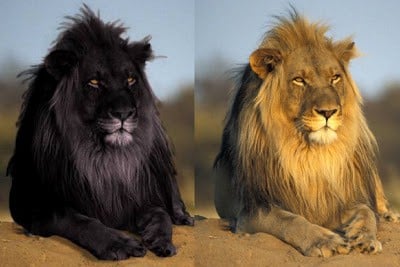Three photos of what appear to be completely black lions have been posted on Facebook in South Africa.
Lions are generally yellow gold in colour, with manes that range from blonde to reddish-brown and black. Do the photos really show lions with black fur? We checked.

Using a reverse image search, we tracked the first photo to the website Leo Palmer Photography. It shows a male lion in Namibia with the normal yellow gold colour. The black version has been photoshopped.

We found the original of the second photo on the website Cute Home Pets. It shows a white lion. Again, the image on Facebook has been doctored. White lions do exist, but are rare.

The third photo has also been photoshopped to add the black colour. The original can be seen on the Shutterstock website, where it’s captioned: “An African lion standing on a mound, Namibia Africa”.

Melanin is the dark pigment found in skin, hair, feathers, scales, eyes, and some internal membranes of animals. Melanin is also responsible for people’s different skin tones, freckles and moles.
Melanism is a surplus of melanin. A great example of an animal with the condition is the uniquely marked zebra in Maasai Mara, Kenya.
Another example, National Geographic says, is several species of wildcat – jaguars, leopards, and bobcats – that carry the gene that causes melanism, causing the cats’ fur to be dark. – Taryn Willows
Lions are generally yellow gold in colour, with manes that range from blonde to reddish-brown and black. Do the photos really show lions with black fur? We checked.

Black added to original photos
Using a reverse image search, we tracked the first photo to the website Leo Palmer Photography. It shows a male lion in Namibia with the normal yellow gold colour. The black version has been photoshopped.

We found the original of the second photo on the website Cute Home Pets. It shows a white lion. Again, the image on Facebook has been doctored. White lions do exist, but are rare.

The third photo has also been photoshopped to add the black colour. The original can be seen on the Shutterstock website, where it’s captioned: “An African lion standing on a mound, Namibia Africa”.

Animals with melanism
Melanin is the dark pigment found in skin, hair, feathers, scales, eyes, and some internal membranes of animals. Melanin is also responsible for people’s different skin tones, freckles and moles.
Melanism is a surplus of melanin. A great example of an animal with the condition is the uniquely marked zebra in Maasai Mara, Kenya.
Another example, National Geographic says, is several species of wildcat – jaguars, leopards, and bobcats – that carry the gene that causes melanism, causing the cats’ fur to be dark. – Taryn Willows
Republish our content for free
For publishers: what to do if your post is rated false
A fact-checker has rated your Facebook or Instagram post as “false”, “altered”, “partly false” or “missing context”. This could have serious consequences. What do you do?
Click on our guide for the steps you should follow.
Publishers guideAfrica Check teams up with Facebook
Africa Check is a partner in Meta's third-party fact-checking programme to help stop the spread of false information on social media.
The content we rate as “false” will be downgraded on Facebook and Instagram. This means fewer people will see it.
You can also help identify false information on Facebook. This guide explains how.



Add new comment